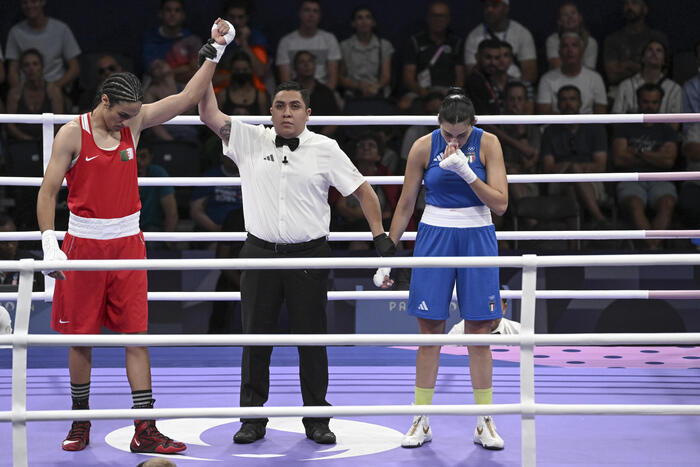The Paris Olympics have been a spectacle of sportsmanship and competition, but one event that has drawn significant attention is the boxing match between the Algerian Imane Khelif and Italian Angela Carini. The bout was highly anticipated, with both boxers having a strong history in the sport. However, the match took an unexpected turn when Angela Carini withdrew just 46 seconds into the fight after having taken two punches to the face.
The match stirred up a controversy around Khelif’s biological identity. With a higher-than-normal testosterone and a Y chromosome, the question arose as to whether she should be allowed to compete against women in what many would agree is a brutal and dangerous sport. Carini called a halt to the fight and saying “non e’ giusto” (it’s not fair) walked away from Khelif, refusing to shake hands.
On Friday, Carini, speaking to La Gazzetta dello Sport, apologized to Khelif for not shaking hands. “It wasn’t something I intended to do.” She added, “Actually, I want to apologize to her and everyone else. I was angry because my Olympics had gone up in smoke.” The situation escalated quickly, with opinions flooding social media and news outlets, turning the athletes’ Olympic dream into a global discussion point.
Carini’s apology seemed heartfelt and sincere. She expressed regret for the actions that followed the match, clarifying that her decision to not shake hands was not premeditated but a result of the overwhelming emotions of the moment. She added that if she and Khelif met again, she would “embrace her.”

Inevitably, Khelif’s biological identity has become part of the raging debate about transgender women participating in women’s competition. But what has been overlooked by many is that she is not a transgender woman. Instead, she has Swyer Syndrome, also known as XY gonadal dysgenesis, a rare genetic condition that challenges common perceptions about sex and gender. Individuals with Swyer Syndrome are typically born with typical female genitalia but have an XY chromosome pattern, which is usually associated with males. In Swyer Syndrome, individuals have underdeveloped gonads, known as “streak gonads,” which are functionless fibrous tissues instead of working ovaries or testes. In other words, Khelif is not transgender, and does identify as intersex; she is a woman whose development did not follow the average pattern.
As a significant sidebar to the controversy, the inevitable question is this: if Carini felt strongly enough about the unfairness of fighting against an opponent whose identity as a woman was in question, why didn’t she object at the time that she was informed she would be fighting her? Why wait until she was already in the ring to cry “unfair!”
There were no surprises about Khelif, she came into the Olympics with a controversial background due to a previous disqualification from the Russia-led International Boxing Association championships after failing an unspecified gender eligibility test.
The International Olympic Committee has allowed both Khelif and Chinese Tapei’s Lin Yu‑ting to compete at the Paris Olympics because both boxers have passports that indicate they are female, and they have been competing in international boxing competitions for many years in the women’s category without controversy.
Carini cited the pain from Khelif’s powerful punches and concerns for her own well-being as reasons for her decision to walk away after only 46 seconds and two punches. The Italian boxer, who noted that she trains with her brothers, was taken back by the strength of the punches. Many would point out that this is the Olympics, where there is a gold medal at stake and the competition is notoriously fierce; it’s not like a sparring session with her brothers.
While we have no right to question her decision to prioritize what she saw as her safety at that moment, we can still be puzzled by how quickly she threw in the sponge. Carini is not a novice, why did she exhibit so little determination to win?
The match’s abrupt end has added fuel to the debates about gender eligibility in sports, with various parties, including the Italian Olympic Committee and the International Olympic Committee, weighing in on the matter. It remains to be seen whether there will be changes made to the eligibility requirements.












